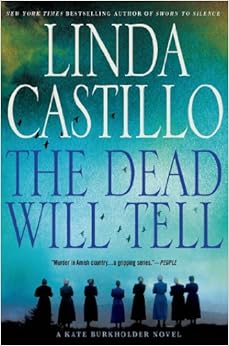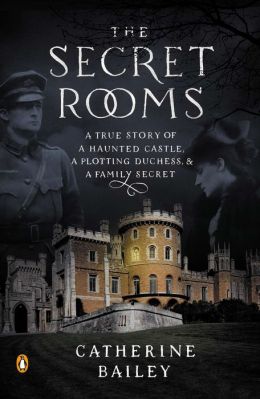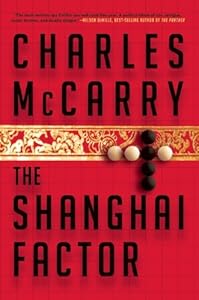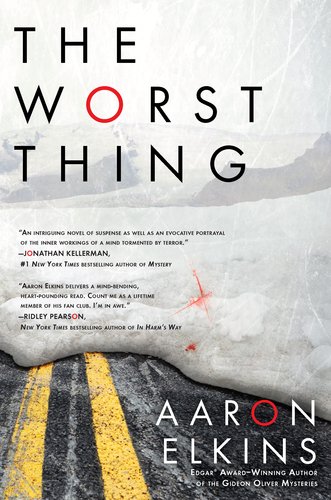

A secret shared is a secret lost. And this goes double for spies. That's the message I take away from two books I just read, Charles Cumming's
A Foreign Country and James Church's
A Drop of Chinese Blood. Both Cumming and Church have intelligence agency experience (Cumming with MI6 and Church (a pseudonym) with the CIA in Asia) and their sophisticated books simmer with secrets, mysterious disappearances, double dealings, betrayals, conspiracies and hopes of redemption.
 A Foreign Country
A Foreign Country opens in Tunisia, where ex-pat Jean-Marc Daumal mourns for his 20-year-old British
au pair, Amelia Weldon, with whom he was having an affair. Now her passport and belongings are missing and she has disappeared. As much as he loved Amelia, he wonders if what had bound them together was "a shared aptitude for deceit."
Flash forward thirty-some years to the present. Philippe and Jeannine Malot, an elderly vacationing French couple, are killed on the beach in Egypt. A "target" called HOLST is kidnapped in Paris. Thomas Kell (age 42, estranged from his wife and forced to retire from MI6 months earlier) receives a phone call from MI6's Jimmy Marquand. Amelia Levene, who's due to take over as chief of the British Secret Intelligence Service in six weeks, is missing from Nice. It's possible she's only having an affair, but maybe not. Kell is the only one who really knows what makes Levene tick. If he finds her quickly without attracting attention, all will be forgiven and Kell can come in from the cold.

The past is never far from the present for this book's characters. Take Kell for example. His entire personality grew out of a talent for the clandestine. He can't remember who he had been before the tap on the shoulder to join the SIS at twenty and he hasn't been able to create a successful life since retirement. All he knows is "the calling of the secret world." Kell despises the increasingly corporatized atmosphere within SIS and the attention his former superiors paid to their own personal advancement. He likes Levene and sees her as the "last roadblock preventing SIS from turning into a branch of the Health and Safety Executive," even though the male-dominated agency is nearly allergic to a female chief. Kell tracks her down and when he does, he discovers the game of hide and seek is only beginning.

Cumming puts his SIS experience to good use. MI6 gossip and traditions, interrogation techniques (Kell has interesting comments about the CIA in Afghanistan), interactions between intelligence agencies and increasingly tech-heavy spycraft feel authentic and are woven tightly, with clear writing, into a labyrinthine plot. How easy for spies now to snap photos with camera phones, conduct research online, communicate via cell phones and email and use GPS devices for traveling and tracking. But how difficult to avoid detection, crack encrypted passwords, manage with no cell phone reception and escape being captured or killed! Whereas a spy's methods and equipment have changed, the personal toll of a career in espionage hasn't. I really liked the complexity and insights of major characters Thomas Kell and Amelia Levene. The villains are nasty, but Cumming makes them three-dimensional humans. The settings in France, Tunisia and England are well described.
A Foreign Country is Cumming's fourth stand-alone book and was published in 2012 by St. Martin's Press. It comes after last year's
The Trinity Six and won 2012's Steel Dagger Award. Fans of John le Carré or Olen Steinhauer should enjoy it.

Cumming's Amelia Levene is a beautiful woman but, according to
A Drop of Chinese Blood's Major Bing Zong-yuan, Fang Mei-lin is the most beautiful woman in the world. For weeks rumors have been flying that she might show up in the far-flung Chinese town of Yanji, where Bing is director of the Ministry of State Security operations on the China-North Korea border. Bing's MSS superiors in Beijing have been happy with his record of controlling corruption and keeping Yanji as clean of North Korean operations "as could be expected." They've recently sent special couriers warning him that he's responsible for Madame Fang's safety. When she arrives, she refuses to talk to Bing and surprises him by her intimacy with his Uncle O, a wily police detective in Pyongyang until he left North Korea in a hurry and came to stay with Bing. O is supposedly working as a private investigator, but he spends most of his time in his workshop at Bing's home making plans for bookshelves. O and Madame Fang go out for the night and the next day O says they'll meet again. Instead, she disappears over the river into North Korea.

Sudden disappearances aren't out of the ordinary in Yanji. A year before Bing arrived, his MSS predecessor vanished without explanation. After taking all their cash, Bing's wife drove off with a Japanese pastry chef in Bing's car. Lieutenant Fu Bin, a Third Bureau spy planted in O's special bureau, left unexpectedly. Now, Du Hwa, a young woman whose cherry-red lips and dress make Bing long for fruit, tells O that her father, a master forger and counterfeiter, is missing and she insists O must find him. It's a very urgent matter because some body pieces, assumed to be Mr. Du, have arrived and are being stored in her brother's restaurant freezer.
 |
Yanji, China is close to the northern tip of North Korea.
It isn't considered a plum assignment for an MSS bureau chief. |

Unfortunately, in the wake of Madame Fang's disappearance, O is compelled to join his nephew on a Beijing-ordered escort-and-recovery mission (dropping them in Ulan Bator, Mongolia before shipping them to North Korea) that is so mysterious and complicated these two men, responsible for carrying it out, must form multiple hypotheses to try to understand it. As O explains, with more than one hypothesis, "you don't end up stuffing all the evidence into one bag, whether or not it fits." The bigwigs in Beijing exert enormous control in many disturbing ways and this draws both satirical comments and apprehension from Bing, the book's narrator. The stunning amount of scheming by the various criminals and agents made me dizzy. Happily, O, Bing or someone else explained (or more often postulated) what the hell people were thinking and doing so I was able to keep up. It's not the first time a book has convinced me I don't have the guile to be a spy but I'm
really not cut out to spy for China or North Korea. Or Mongolia, for that matter.
I don't want to give you the impression that because of its complex plot this book is no fun. It's very fun. The characters and settings are drawn extremely well. How often do you get to peek at an honest Chinese MSS agent's life on the North Korea border, sit at a table of Kazakh agents in an Irish bar in Ulan Bator or ride in a shipment crate with three men and a corpse on a train to North Korea? In addition to all the characters' entertaining maneuvering, the long-suffering Bing and uncooperative O have a sparring relationship that reminds me of Rex Stout's Archie and Nero Wolfe––if you throw in a smidgen of
Kung Fu's Master Po befuddling his student Grasshopper. Although I must give Bing credit. He operates by the seat of his pants much of the time but he's a smart guy who knows more than he lets on. After all, his dad was O's brother. As for O, it's impossible for Bing, and us, to know exactly what O's "retirement" means.
It looks as if the four-book Inspector O series, which is set in North Korea and begins with
The Corpse in the Koryo, is finished and a new series, set in China and featuring Major Bing and his uncle O, begins with
A Drop of Chinese Blood, published by Minotaur Books in 2012. It helps if you've warmed up your noggin with the Inspector O books but it's not absolutely necessary. If you like Martin Cruz Smith, give this book a whirl. I loved it.


 In the Blood by Lisa Unger (Touchstone, January 7, 2014; paperback edition by Pocket Books, July 22, 2014) (Non-series)
In the Blood by Lisa Unger (Touchstone, January 7, 2014; paperback edition by Pocket Books, July 22, 2014) (Non-series)



































